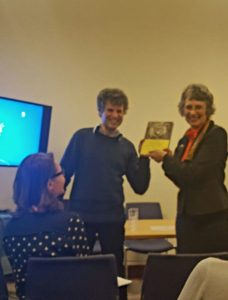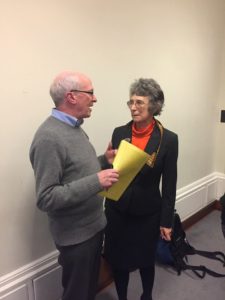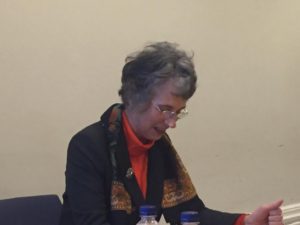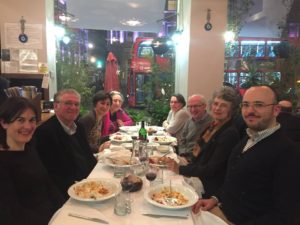Stefano Jossa and Katia Pizzi talk about the Festschrift celebrating the recent retirement of Professor Jane E Everson (Royal Holloway University of London)
‘Academic’, in daily conversation, tends to mean ‘of no consequence, irrelevant’; and yet, to disprove conversational language, there are people who, more traditionally, think of ‘Academic’ as synonymous with ‘concerned with the pursuit of research, education, and scholarship’, to the extent that they devote their lives to Academy and the study of its historical background and social meaning. ‘Chivalrous’ is similarly not a more fortunate idiom, since it has generally come to mean ‘ridiculously old-fashioned’; and yet there are people who think of chivalry as an aristocratic ideal, referred to a time when women and men were more generous and courteous.
Among those who still value academy and chivalry, a prominent place has to be given to Professor Jane E. Everson, who has devoted most of her scholarly career to understand the dynamics of Italian chivalric poetry and was the recipient of the AHRC-funded Italian Academies project (2010-14). Professor Everson has been serving the field of Italian Studies loyally for more than forty years and has recently retired after teaching at the Universities of Oxford, Reading, Leicester and London, Royal Holloway. To pay homage to her honourable career, two colleagues at Royal Holloway, Stefano Jossa and Giuliana Pieri, gathered a collection of essays for a Festschrift, entitled Chivalry, Academy, and Cultural Dialogues : The Italian Contribution to European Modernity (Legenda).
 The book was launched at the IMLR on 15 February 2017, with talks given by Professors Corinna Salvadori (Trinity College Dublin), Diego Zancani (Oxford) and Martin McLaughlin (Oxford), introduced by Katia Pizzi, in the presence of Professor Everson. The event combined scholarly engagement and personal tribute in a way that it would be impossible to discern whether the main focus was the dedicatee or the book itself. Far from being a collection of scattered essays, the book aims to mirror Professor Everson’s scholarly interests in chivalric poetry, the Italian academies and Anglo-Italian relations, often explored in an archaeological manner (in Foucaultian terms) to ascertain their legacy in our time.
The book was launched at the IMLR on 15 February 2017, with talks given by Professors Corinna Salvadori (Trinity College Dublin), Diego Zancani (Oxford) and Martin McLaughlin (Oxford), introduced by Katia Pizzi, in the presence of Professor Everson. The event combined scholarly engagement and personal tribute in a way that it would be impossible to discern whether the main focus was the dedicatee or the book itself. Far from being a collection of scattered essays, the book aims to mirror Professor Everson’s scholarly interests in chivalric poetry, the Italian academies and Anglo-Italian relations, often explored in an archaeological manner (in Foucaultian terms) to ascertain their legacy in our time.
In a brief introduction, Stefano Jossa explained the genesis, both professional and emotional, of the book, bridging between Italian early modernity and European modernity to pay homage to a scholar who always worked on the ‘success of the unsuccessful’ as a means to contrast pop drifts of University culture in the contemporary media-dominated world. Admonishing that we learn more from diversity than homogeneity, Professor Salvadori tantalisingly explored the first section of the book, highlighting the presence of a chapter on Professor Everson’s lifelong scholarly interest, Il Mambriano by Francesco Cieco, as well as on Ludovico Ariosto’s masterpiece, the five-hundred-year-old Orlando Furioso (three chapters), Francesco’s Berni’s Rifacimento of Matteo Maria Boiardo’s Inamoramento de Orlando, and some fifteenth-century cantari.
 Following on from this, Professor Zancani stressed in an illuminated way the connection between Professor Everson’s work on the Italian Academies and the six essays included in section 2, exploring a number of personalities, academies, works and fine-art practices, from Giulio Camillo, Marcantonio Piccolomini and Angelo Ingegneri to Galileo and from the Thesoro politico to copper engraving. Finally, Prof McLaughlin affectionately recalled his friendship with the dedicatee, taking it as symptomatic of the route of Italian Studies in the UK, in order to introduce the third and final section on cultural communities and Anglo-Italian relations, including essays on oral Petrarchism, Machiavelli’s use of jokes, Sebastiano del Piombo’s hieroglyphs in the portrait of Andrea Doria, Shelley and Dante, Gramsci and Kipling and Soldati and music.
Following on from this, Professor Zancani stressed in an illuminated way the connection between Professor Everson’s work on the Italian Academies and the six essays included in section 2, exploring a number of personalities, academies, works and fine-art practices, from Giulio Camillo, Marcantonio Piccolomini and Angelo Ingegneri to Galileo and from the Thesoro politico to copper engraving. Finally, Prof McLaughlin affectionately recalled his friendship with the dedicatee, taking it as symptomatic of the route of Italian Studies in the UK, in order to introduce the third and final section on cultural communities and Anglo-Italian relations, including essays on oral Petrarchism, Machiavelli’s use of jokes, Sebastiano del Piombo’s hieroglyphs in the portrait of Andrea Doria, Shelley and Dante, Gramsci and Kipling and Soldati and music.
This was a most successful event: best wishes to Professor Everson to carry on and go further in her research. The plus ultra reproduced on the frontispiece of the book, from the original Atlante Veneto (1691–97) by Vincenzo Coronelli, is a reference to the Argonauts’ journey and an appropriate motto of Professor Everson’s life and works.
Dr Katia Pizzi, Senior Lecturer in Italian Studies, IMLR
Dr Stefano Jossa, Reader in Italian, Royal Holloway University of London



